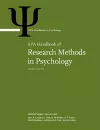
APA Handbook of Research Methods in Psychology
6 contributors - Set / collection
£723.00
Harris Cooper, PhD, is the Hugo L. Blomquist Professor, Emeritus, in the department of psychology and neuroscience at Duke University. His research interests concern research synthesis and research methodology, and he also studies the application of social and developmental psychology to education policy. His book Research Synthesis and Meta-Analysis: A Step-by-Step Approach (2017) is in its fifth edition. He is the coeditor of the Handbook of Research Synthesis and Meta-Analysis (3rd ed. 2019). In 2007, Dr. Cooper was the recipient of the Frederick Mosteller Award for Contributions to Research Synthesis Methodology, and in 2008 he received the Ingram Olkin Award for Distinguished Lifetime Contribution to Research Synthesis from the Society for Research Synthesis Methodology. He served as the chair of the Department of Psychology and Neuroscience at Duke University from 2009 to 2014, and from 2017 to 2018 he served as the dean of social science at Duke. Dr. Cooperchaired the first APA committee that developed guidelines for information about research that should be included in manuscripts submitted to APA journals. He currently serves as the editor of American Psychologist, the flagship journal of the American Psychological Association.
Marc N. Coutanche, PhD, is an associate professor of psychology and research scientist in the Learning Research and Development Center at the University of Pittsburgh. Dr. Coutanche directs a program of cognitive neuroscience research and develops and tests new computational techniques to identify and understand the neural information present within neuroimaging data. His work has been funded by the National Institutes of Health, National Science Foundation, American Psychological Foundation, and other organizations, and he has published in a variety of journals. Dr. Coutanche received his PhD from the University of Pennsylvania, and conducted postdoctoral training at Yale University. He received a Howard Hughes Medical Institute International Student Research Fellowship and Ruth L. Kirschstein Postdoctoral National Research Service Award, and was named a 2019 Rising Star by the Association for Psychological Science.
Linda M. McMullen, PhD, is professor emerita of psychology at the University of Saskatchewan, Canada. Over her career, she has contributed to the development of qualitative inquiry in psychology through teaching, curriculum development, and pedagogical scholarship; original research; and service to the qualitative research community. Dr. McMullen introduced qualitative inquiry into both the graduate and undergraduate curriculum in her home department, taught courses at both levels for many years, and has published articles, coedited special issues, and written a book (Essentials of Discursive Psychology) that is part of the American Psychological Association’s series on qualitative methodologies, among other works. She has been engaged with building the Society for Qualitative Inquiry in Psychology (SQIP; a section of Division 5 of the APA) into a vibrant scholarly society since its earliest days, and took on many leadership roles while working as a university professor. Dr. McMullen’s contributions have been recognized by Division 5 of the APA, the Canadian Psychological Association, and the Saskatchewan Psychological Association.
Abigail Panter, PhD, is the senior associate dean for undergraduate education and a professor of psychology in the L. L. Thurstone Psychometric Laboratory at University of North Carolina at Chapel Hill. She is past president of the American Psychological Association’s Division 5, Quantitative and Qualitative Methods. As a quantitative psychologist, she develops instruments, research designs and data-analytic strategies for applied research questions in higher education, personality, and health. She serves as a program evaluator for UNC’s Chancellor’s Science Scholars Program, and was also principal investigator for The Finish Line Project, a $3 million grant from the U.S. Department of Education that systematically investigated new supports and academic initiatives, especially for first-generation college students. Her books include the APA Dictionary of Statistics and Research Methods (2014), the APA Handbook of Research Methods in Psychology (first edition; 2012), the Handbook of Ethics in Quantitative Methodology (2011), and the SAGE Handbook of Methods in Social Psychology (2004), among others.
David Rindskopf, PhD, is distinguished professor at the City University of New York Graduate Center, specializing in research methodology and statistics. His main interests are in Bayesian statistics, causal inference, categorical data analysis, meta-analysis, and latent variable models. He is a fellow of the American Statistical Association and the American Educational Research Association, and is past president of the Society of Multivariate Experimental Psychology and the New York Chapter of the American Statistical Association.
Kenneth J. Sher, PhD, is Chancellor’s Professor and Curators’ Distinguished Professor of Psychological Sciences, Emeritus, at the University of Missouri. He received his PhD in clinical psychology from Indiana University (1980) and his clinical internship training at Brown University (1981). His primary areas of research focus on etiological processes in the development of alcohol dependence, factors that affect the course of drinking and alcohol use disorders throughout adulthood, longitudinal research methodology, psychiatric comorbidity, and nosology. At the University of Missouri he directed the predoctoral and postdoctoral training program in alcohol studies, and his research has been continually funded by the National Institute on Alcohol Abuse and Alcoholism for more than 35 years. Dr. Sher’s research contributions have been recognized by professional societies including the Research Society on Alcoholism and the American Psychological Association, and throughout his career he has been heavily involved in service to professional societies and scholarly publications.